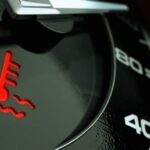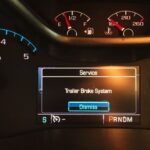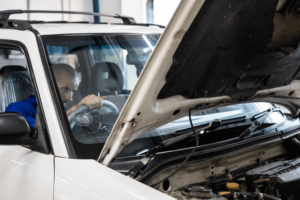If the Engine Hot AC Off light suddenly pops up on your dash, it can lead to serious engine problems. Should you continue driving with this warning light turned on? In this article, I’ll discuss engine hot AC turned off – what this warning light means?
When the Engine Hot AC Off light shows up abruptly on your dash, it means that the electric cooling fan of the engine is not functioning. This will result in the engine’s overheating because it was running hot continuously. If not corrected immediately, it could lead to the engine seizing up.
This situation is the leading cause of engine breakdowns all over the world. When the engine temperature reaches the highest it can take, the car’s computer will notice too much heat, or the car’s cooling fan is not working. The ECU will turn off the car’s AC to reduce the temperature.
Read on to learn more about what it means when the Engine Hot AC Turned Off warning light shows up on your dash and the details you need to know.
Engine Hot AC Turned Off – What Does This Warning Light Mean?

The Engine Hot AC Off warning light is something that you shouldn’t ignore if it suddenly shows up on your dashboard. If you take this warning for granted, your engine can develop serious problems.
This warning light means the cooling fan of your car’s AC system is not working. As such, your engine is running hot continuously as you keep on driving. It will result in your engine overheating. Overheating engine is the leading cause of engine breakdown globally.
The car’s ECU will take notice of the excessively high temperature of the engine. It will turn off the car’s cooling fan to reduce the heat. That’s when the AC OFF light will appear on your dashboard.
Generally, this warning light will pop up on the dash if there’s a malfunction in the car’s cooling system where heat cannot get out of the engine bay. A leak in the system, a clogged hose, a damaged water pump, or a broken radiator fan could cause it.
Perhaps the car’s AC system is consuming lots of energy that the motor can’t supply, especially if the cooling fan is not working. As a result, the AC will shut off because the engine temperature rises so high. It goes off, so the engine temperature will stop rising.
The Engine Hot AC Off warning light is one of the results of the ECU’s work in managing and controlling a vehicle’s operation. You should not ignore it because it tells you something serious is going on in your engine.
What Can Cause the Engine Hot AC Off Warning Light to Come On?
There are plenty of reasons your car’s ECU will trigger this warning light to turn on your dash. Here are some of these reasons:
1. Radiator Cooling Fan Issues
The radiator fan is there to cool down the coolant that passes through its many fins before it goes back into the cooling system.
So, if it is not working, the cooling that the coolant needs before it goes back to circulate the tubes is drastically reduced. The engine temperature will still keep on rising as it runs.
The obvious consequence is an overheating engine. If the cooling effect is reduced, as the engine operates, the heat produced will be excessive, causing the seizing up of the pistons.
When that happens, the engine will go dead. You need to prepare a considerable amount of money to get it working again.
2. Bad Coolant Temperature Sensor
The work of a coolant temperature sensor is to measure the coolant temperature and sends the information to the car’s ECU. The ECU will then process this information to do its work in optimizing engine operation.
So, if this temperature sensor is not doing its job, perhaps it is malfunctioning or is broken altogether, the ECU will have nothing to process in the matter of coolant cooling.
Since the ECU is not receiving any data from the sensor, it will simply trigger the Engine Hot AC Off warning light on your dash to get your attention.
The coming on of this light is the ECU’s way of warning you that you are having a problem in this area of your engine that you need to address if you don’t want to have engine problems.
If the ECU is up to its task, it will also modify the fuel injection time and turn the radiator fan on or off so the engine can operate optimally.
However, if this sensor goes bad, it will cause the cooling fan to operate erratically. This will lead to insufficient cooling down of the coolant or even being unable to cool down the coolant. The result: your engine will overheat.
3. Insufficient Coolant
This is the most common cause of why an engine overheats. The purpose of the coolant is to reduce the heat generated by a running engine. A tremendous amount of heat is produced while the engine operates.
For the engine to continue operating as it is designed to, it must be adequately cooled down. The cooling effect can only be done if sufficient coolant circulates the engine cooling system.
So, if the engine’s coolant level is too low, how can you expect it to supply the necessary cooling effect? You must fill up the coolant reservoir immediately so the coolant can do its job efficiently.
4. Malfunctioning Thermostat Valve
The thermostat valve is the component of an engine’s cooling system that controls the amount of cooling fluid being circulated. If the engine temperature rises to a certain degree, this valve will open to permit the coolant to flow.
If this valve is blocked or stacked up, the coolant will not flow. This will lead to the overheating of the engine.
Again, what does it mean when you see “Engine Hot AC Turned Off?” If your car’s engine is hot, but the AC is off, it’s probably due to a faulty AC compressor. A blown fuse or a malfunctioning relay might cause this.
5. Blown Up Head Gasket

The work of the head gasket is to seal the space between the engine block and the cylinders. Its secondary function is to keep burned fuel or gasses inside the cylinders and prevent the engine oil or coolant from entering.
If this gasket is damaged, the liquid will penetrate the engine cylinders. This is bad for the engine because no other than air and fuel should be admitted inside the cylinders. All sorts of serious engine problems can result if this happens.
This problem is hard to diagnose because you can only visually inspect the head gasket. If you want to see what is happening inside the engine which caused the engine problem, you have to remove this gasket and open up the engine.
This is a very consuming and difficult operation involving time and money. So, I hope this is not the cause of your present difficulty.
Interestingly, a blown head gasket can also result in your car losing some coolant because of leaks. You know this will lead to a low coolant level, which results in an overheating engine.
If you smell the strong sweet smell of coolant around your engine, this could cause your cooling problem.
6. Bad AC Compressor
A failing air conditioning compressor can also trigger the Engine Hot AC Off warning light. You will know if this is the cause of your problem if there is temperature fluctuation in your engine. It can also lead to an overheating engine.
If your car’s AC stops working, heat instead of cold temperature will prevail inside your vehicle. To fix a malfunctioning air conditioner, you need a certified HVAC technician.
What Can You Do If the Engine Hot AC Off Warning Light Comes On?

Coolant problems often end up in the problem of overheating engines. You can do the following when you experience an overheating engine:
1. Turn Up the Heat Inside the Cabin
This tip may appear to be contrary to what you need to do when your engine overheats. However, this technique will help to reduce engine stress for a while. This will help cool down the engine and allow you to drive your car a little more until you get to the nearest car service shop.
But make sure to turn the AC off, so you won’t complicate your present situation.
2. Slow Down and Pull Over
The next thing you should do is to slow down and get to the nearest place where you can safely park your vehicle. Don’t forget to turn on your hazard lights so other drivers will be alerted to your present situation.
3. Shut Off Your Engine
To reduce the heat of the engine, turn it off.
4. Wait for 15 Minutes Before Opening the Hood
Most drivers will open their hoods immediately if they encounter this problem. Don’t do this. Yes, it will allow outside cool air to reduce the high temperature of your engine.
But, if you are not careful, opening up the hood immediately and releasing the radiator cap will suddenly allow hot steam from the radiator to blow up toward your face. You can be burned. The excessive heat will cause the radiator’s steam to burn your skin and your hands.
So, wait for about 15 minutes before you open the hood. This will be enough time to cool down the hot metal of the engine parts.
5. Check the Coolant Level
Once everything has settled inside the engine bay, check the fluid level of the coolant reservoir. Top it up if necessary. You should only use the coolant brand and grade the car manufacturer recommends.
6. Ask for Professional Help
Call for a tow truck so they can bring your vehicle to the nearest car service center where the problem can be diagnosed and the proper fix applied.
7. Conduct Regular Preventive Maintenance
Once you can fix the problem, you should not neglect regular preventive maintenance of your vehicle. Engine overheating is primarily due to the lack of the vehicle’s regular upkeep.
Don’t be like some car owners who only keep driving their vehicles daily without being concerned about their regular upkeep and maintenance. Keep your vehicle running efficiently by doing its required PM.
In Closing
If you see the Engine Hot AC Off light on your dashboard, it means that your car’s electric cooling fan is not working. This warning light was triggered because your engine is overheating. After all, it is continuously running hot. Your engine could seize up if this situation is not corrected.
This is the leading cause of engine breakdowns around the world. Vehicles can only take so much heat to be able to operate without having problems.
But if an engine reaches a very high temperature, especially if the AC’s cooling fan stops working, this warning light will appear on your dash. The car’s ECU will turn off the AC to reduce the temperature.







![Read more about the article Find License Plate Number [By VIN and Other Methods]](https://roadsumo.com/wp-content/uploads/2021/06/find-license-plate-number-300x200.jpg)

